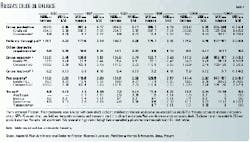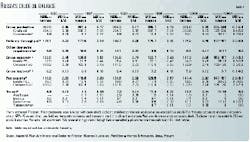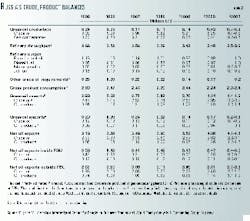Russia's oil output expected to exceed official forecasts
While official forecasts of Russia's crude oil and condensate output this year stand firm at 325 million tonnes (6.5 million b/d), the Moscow-based International Center for Petroleum Business Studies (ICPBS), contends that the country's crude oil output will reach as much as 335-400 million tonnes (6.7-6.8 million b/d).
"The Russian energy ministry chronically fails to hit the bar with its annual forecasts of national oil production, which is no longer centrally planned or government-controlled," said the center's general director, Eugene Khartukov.
A year ago, for example, the Russian energy ministry foresaw indigenous output of crude oil and condensate for 2000 as 307 million tonnes, but actual production has reached 324 million tonnes-well in line with ICPBS's year-ago prediction of 320-325 million tonnes.
According to Khartukov, Russia's crude oil exports could reach 153-157 million tonnes this year, with 126-130 million tonnes of Russian oil going to destinations other than the former Soviet Union (FSU) and 26-28 million tonnes destined for FSU republics.
As usual, some 6 million tonnes of crude oil and condensate will be imported from Kazakhstan, and about 180 million tonnes will be refined domestically. In addition, about 15 million tonnes of foreign crude-mainly from Kazakhstan and Azerbaijan-will go outside the FSU through oil pipelines controlled by Russia's Transneft.
Finally, Russia will inevitably lose 10 million tonnes afield and in transport or will use it directly as fuel and paving material (Table 1).
"The country's oil production could be even higher if it were not restricted by the lack of spare export capacities, " added Khartukov. "Still, the earmarked commissioning of new export pipelines, such as CPC [the Caspian Pipeline Consortium] and BPS [the Baltic Pipeline System], will definitely facilitate a further substantial growth of [Russia's] oil production after 2001," he concluded.
Despite Russia's having recorded substantial economic growth last year-the country's real gross domestic product grew by an estimated 5%-its domestic oil consumption shrank to 112 million tonnes from 122 million tonnes, reflecting higher domestic crude oil and products prices and resulting in a decrease of more than 12% in the oil intensity of Russia's national economy.
This year, according to ICPBS's forecast, Russia's domestic oil demand will rise to 115-120 million tonnes, while the country's total crude oil and products exports to areas outside the FSU will increase in 2001 to an all-time record of 185-190 million tonnes (3.7-3.8 million b/d) from 180.5 million tonnes (3.61 million b/d) last year (Table 2).


